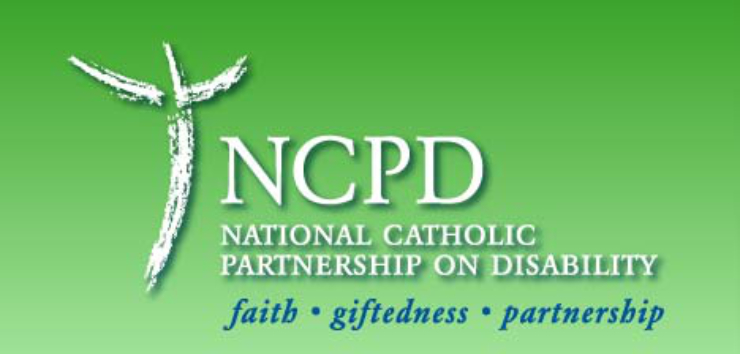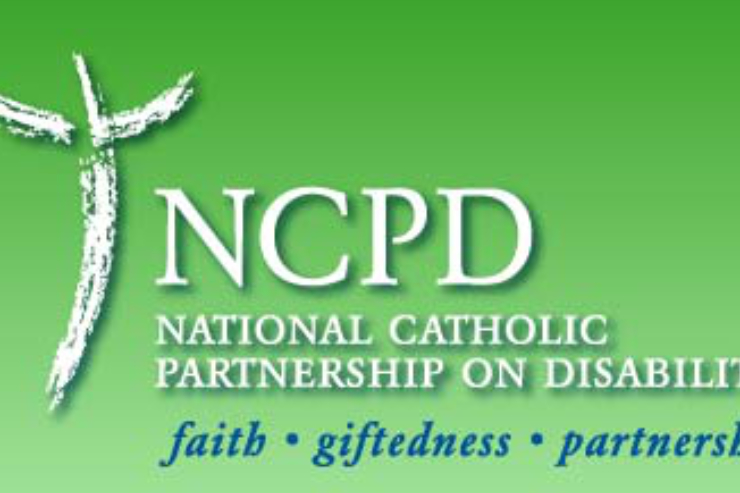 “By reason of their Baptism, all Catholics are equal in dignity in the sight of God and have the same divine calling.” (Guidelines for the Celebration of the Sacraments with Persons with Disabilities; 1995)
“By reason of their Baptism, all Catholics are equal in dignity in the sight of God and have the same divine calling.” (Guidelines for the Celebration of the Sacraments with Persons with Disabilities; 1995)
When I became a mom of a child with a developmental delay who otherwise appeared typical, I wasn’t shaken enough to notice people who were marginalized. However, after giving birth to our youngest daughter who was born with a rare genetic condition called Apert Syndrome, I entered a realm that I neither desired nor anticipated, because I learned that Sarah would undergo numerous surgeries throughout her life, mainly affecting her skull and facial development.
My husband and I connected with close friends in our faith community, as well as families who also had children with Apert Syndrome. What we quickly realized was that neither could offer a comprehensive understanding of people with special needs, nor could they direct us to appropriate resources. Either they were Catholics without the special needs perspective, or they were parents who had medically fragile children but didn’t otherwise possess a foundation of faith.
The National Catholic Partnership on Disability (NCPD) weds faith and disability outreach in one non-profit organization, and it does so with finesse and a deeply rooted perspective of redemptive suffering, the dignity of the human person, and the compassion to reach those who have otherwise been forgotten or neglected by a society that doesn’t see their inherent value.
I had the privilege of chatting with NCPD Executive Director, Janice Benton, about the mission of NCPD and how the organization serves those with special needs, as well as their families, at both the parish and diocesan levels. Officially formed in 1982 “with a grant from the American Board of Catholic Missions,”* NCPD was originally intended to work “primarily with people with intellectual disability and the deaf community.” Both are still very integral to the ministry of NCPD.
Jan shared with me that their main goal as an organization is to be a resource for diocesan disability offices and parish ministries with the intent to assist them (through multimedia presentations, social media, and a dynamic website) in integrating people with disabilities into the heart and life of the parish, rather than offering separate programs that would set them apart. As Catholics, we are called to ensure that those who are disenfranchised are “nourished in their faith, sustained by the Sacraments, and able to contribute to their parish communities according to their interests and abilities.”
What a refreshing perspective of humanity! Jan explained that this underpinning of NCPD’s mission is largely influenced by the 1978 Pastoral Statement of U.S. Catholic Bishops on People with Disabilities that states, “The central meaning of Jesus’ ministry is bound up with the fact that He sought the company of people who, for one reason or another, were forced to live on the fringe of society” (paragraph 12). And this propels the staff and volunteers that comprise NCPD to carry out Jesus’ mission and ministry.
NCPD is changing the hearts and minds of many people in secular organizations precisely because of their profound respect for human life, which occurs mostly through collaborative efforts with these organizations, but also as a witness through their work that is catholic in every sense of the word. They “work hard in advocacy efforts to oppose laws and policies that threaten the lives of people with disabilities (such as prenatal diagnosis and the legalization of assisted suicide).”
Clearly NCPD’s perspective is pro-life, because the members recognize the value of people who are different or who are born with syndromes and various diagnoses. Since they are Catholic in nature, NCPD is able to offer a pure message of life and dignity when so many other secular groups avoid the conversation about abortion, contraception, assisted suicide, etc.
There are three main ways that individuals, as well as parishes and diocesan departments, can utilize the support and resources that NCPD offers.
Online
This includes signing up on NCPD’s website to receive their free e-newsletter, accessing ministry specific pamphlets that can be printed and distributed, following their up-to-date news on their Facebook page, and watching their informational videos on their YouTube channel. This type of support is especially useful for families who have medically fragile members and need to have access to vital and encouraging information at odd times of the day or even weekends.
On the phone
Though NCPD currently operates on two full and two part time staff members, they generously offer their time to be “available for phone consultations and to refer [inquiring people] to resources that may be of assistance.” When you’re stuck and need some direction or are perhaps overwhelmed and aren’t sure where to turn, this might be the viable option. It’s also helpful to discuss any questions you may have on the phone, especially if you want to become more involved in NCPD as a volunteer on one of their councils (or even if you want to become a parish liaison who “assists in ensuring that the parish is accessible and welcoming, addressing a variety of issues, including physical access and catechetical programs”).
In person
Though not likely the most convenient or practical option for many caregivers, NCPD is located in Washington, D.C. and welcomes visitors to its site. People can call to schedule an appointment and see for themselves the work and mission of NCPD, as well as obtaining hard copies of their disability resources.
Life for caregivers can be overwhelming at best and daunting or draining at worst. Many of us deal with multifaceted issues and concerns on a daily basis, including the people we encounter who have had little or no exposure to people with differences. While disconcerting, many caregivers are eager to educate others about their loved one’s disease, because it lessens the fear associated with the unknown. Fear can paralyze us into avoiding people who aren’t like us, but Jan offered three incredible tips to assist caregivers in those potentially awkward moments of encountering people who are afraid of or uncomfortable around those who are disabled.
See the person, not just the disability.
Many of us have a tendency to label and categorize everything, including people. Definitions of specific disabilities can tempt us into only discussing the person’s differences rather than introducing the actual person. Jan encourages us to talk about the person, because we are all equal in dignity, and make one’s personhood the central theme of our conversations with strangers. When we do this, others will begin to truly see our loved one with the heart rather than the eye.
Focus on the individual, not a group.
This piggybacks off of point one, because people are more than a diagnosis or condition. People aren’t defined by a disability. It’s true that groups can be helpful when we need to familiarize ourselves with how a condition may develop or what surgical procedures may be necessary, but they mustn’t overshadow our ability to get to know people. This requires us to meet people where they are: talk to them, smile, interact with respect, and find out what their dreams and interests are.
Build relationships, not just a program.
Naturally, NCPD’s mission is mainly to assist people in fostering relationships with those who have special needs. Jan said, “There shouldn’t have to be a program that sets people with disabilities apart from inclusion in the rest of the parish. They shouldn’t be exceptionalized or viewed as problems by parishioners or parish staff members. Start by recognizing people.” When we do this, we understand the unique charisms that every member of the Body of Christ has to offer, whether in a pastoral setting or anywhere in society.
As a mother of children with special needs, I have often felt marginalized right along with them. I have seen the subtle and overt messages portrayed through the media, and I’ve overheard conversations that imply the devaluation of people who need extra support in life. Mostly this has been through the cliché, “poor quality of life.” Conversing with Jan offered me a welcome reprieve from this sort of toxic groupthink, and I realized that the mission of NCPD is my mission, too.
*All quotes were derived from my interview with Jan: Janice Benton, phone interview by Jeannie Ewing, February 29, 2016.
**Note: Because NCPD is a non-profit organization, they welcome donations to continue their ongoing work. “Friends of NCPD contribute a gift of $1,000 — some people have asked their parish to make a donation to NCPD or become a friend.” You can donate here.














